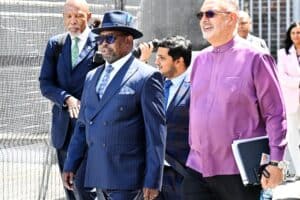Burden falls on individual’s shoulders.

The tax announcements in this year’s budget is going to test the pain tolerance levels of all taxpayers.
Direct and indirect tax increases are a must, and by the looks of things Joe Average is going to fork out the largest chunk of the additional R28 billion needed to balance government’s books.
As though things are not bad enough going forward, it appears that 2016 is going to end on a worse note than earlier anticipated. Tax experts now anticipate the revised shortfall of R23 billion to increase with another R7 billion at most.
Kyle Mandy, tax partner at PwC, says the “volatility” of the monthly tax collection data makes any projections on where the final collection numbers will end very difficult.
He says starting from a lower than anticipated base, with a huge revenue target in a slow-growth economic environment things are going to be tough on taxpayers.
He expects an increase across all personal income tax brackets, except perhaps the lowest bracket (18%), of one percentage point. This will increase the top marginal tax rate for individuals to 42%, filling the revenue hole with at least R15 billion.
Finance Minister Pravin Gordhan will be delivering the budget to parliament on February 22.
Nazrien Kader, head of Deloitte tax services in Africa, says lifting the top marginal rate to 45% could yield R3.5 billion. It is also “conceivable” that a special levy or surcharge may be applied to individuals with earnings above a set threshold.
“This is also likely to apply to companies based on turnover as a means to collect some tax from companies when profits are non-existent,” says Kader.
Andrew Wellsted, tax head at Norton Rose Fulbright, expresses skepticism about the success of bridging the revenue gap by upping individual and even company tax rates.
He says with the economy dragging its heels, taxpayers struggling to make ends meet and companies not coining it, it is a good time to consider an increase in the Value Added Tax rate. An increase of 1% or even 1.5% to 15.5% may have a significant impact on tax collections.
Kader notes that the South African VAT rate is much lower than the 20% in most other jurisdictions. The Davis Tax Committee reported that an increase to 15% will bring South Africa in line with the global average of 15.65% and the African average of 15.25%.
This can yield revenue of between R15 billion and R20 billion. Mandy says an increase is possible, provided there is relief to the poor in the form of an increase in the social grant allowance, or a widening of the zero rated goods.
Both these relief measures are possible and practical to implement in a short time frame. However, given the possible political fallout of a VAT increase, a significant increase in the fuel levy might be another option. A hefty 50c/l increase may yield around R10 billion, says Mandy.
Although an increase in any of these two taxes (VAT or fuel levy) will have an inflationary effect on the economy, it will be less “distortionary” than an increase in direct taxes.
Direct tax increases impact savings and consumption, with people having less after-tax money to save and to spend. This negatively impact on economic growth. An increase in consumption taxes only impacts spending.
Some behavioural-changing taxes such as the proposed carbon tax is expected to be delayed with another year and the sugar tax on sweetened drinks is not expected to be finalised soon.
Mandy does not foresee huge revenue coming from increases in wealth taxes such as estate duty and donations tax.
Factors that may be impacting future collections are low economic growth, continued high levels of corruption and wasteful expenditure in all spheres of government and political instability.
Erika de Villiers, head of tax policy at SAIT, says it is not sustainable to increase the tax burden to balance the country’s books.
Lower economic growth and increased inflation will hit the poor and vulnerable hard. They already suffer the effects of unemployment and high food and transport prices, she says.
“How much could an old age pension government grant, which often has to support a family, really buy even if it is increased from R1 510 to say R1 600? Government should look at tightening its spending further to address the budget deficit.”
Wellsted says it is crucial for the focus to remain on the prevention of corruption and waste. The maintenance of a modern, efficient and trusted revenue collection service with integrity is vital. Without that South Africa will see the lack of compliance seeping in.
The South African Revenue Service and Gordhan are well aware of the impact of these factors on the risk of the tax gap increasing.
Brought to you by Moneyweb
For more news your way, follow The Citizen on Facebook and Twitter.
Support Local Journalism
Add The Citizen as a Preferred Source on Google and follow us on Google News to see more of our trusted reporting in Google News and Top Stories.






